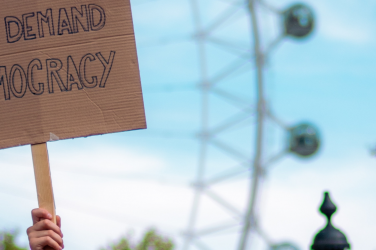E&M’s author Amr Abdelrahim exposes and analyses the racism and xenophobia that has become visible with the West’s media coverage of the Russian invasion and war in Ukraine. While fully supporting the Ukrainian cause, he convincingly argues that the West’s selective moral outrage over war and destruction results in the normalisation of the suffering of millions.
Do the bombs over Kyiv sound louder than the ones that leveled Baghdad? Are the screams of agony of Syrians and Yemenis too far away to reach us? Or is it perhaps that they fall on deaf ears?
Online activists from the Middle East and beyond have been pointing out the stark contrast between the moral outrage that images and sounds from the war in Ukraine have righteously sparked in Western media and among social media users, when other conflicts in the “Global South” have been met with the silence and nonchalance of all but a handful of activists. Rather than a simple case of whataboutism, or an attempt by the “extreme left” to defend Russia, the comparison highlights the racist double standards of the laws, values, and expert discourses that form the basis of the Western moral hegemony in the post-cold war world order, and how they have in turn have been internalised by a large swath of politicians, journalists, and commentators.
The much-commented instances of explicit racism that occurred in recent days on the broadcasts of CBS, BBC, BFM TV, and Al Jazeera are the most striking reminders of the criteria according to which the value of a life is judged in the West. The war in Ukraine is shocking because it is a “relatively European and relatively civilized” country as opposed to Syria and Iraq, where war has been waging for decades (the West’s responsibility for Iraq’s ruin notwithstanding). Similarly, Ukrainians are worthy of our empathy because they are “blond with blue eyes”, because “they look like us and drive cars that look like ours”, and because they “hail from the same civilisation as us”.
The bottom line is clear: they are Europeans, for God’s sake! Needless to say, this European solidarity does not extend to those who have been racialised by Western Europe (Albanians, Bosniaks, Roma, people of African or Asian descent etc.), nor to those who remain subjects of France’s and Britain’s colonial empires.
The bottom line is clear: they are Europeans, for God’s sake! Needless to say, this European solidarity does not extend to those who have been racialised by Western Europe (Albanians, Bosniaks, Roma, people of African or Asian descent etc.), nor to those who remain subjects of France’s and Britain’s colonial empires.
It is clear then that the roots of European (out)rage lie in the fact that conflict is no longer confined to the periphery. Violence in Afghanistan, Sudan, Colombia, or Myanmar – to name only a few – has been normalised in the minds of the West. It has been constructed as an inevitable fatality that can be traced back to essential features of these peoples, when it is, in reality, the heritage of colonialism and a byproduct of the “Global South’s” marginalisation in the globalised economy. Consequently, people with black hair and brown eyes are less deserving of Western empathy. Their suffering, as Moky Makura points out, is reported on “in terms of the issues, trends, and numbers – rather than the people, the emotions, and the lives destroyed”.
Hence, Western audiences have become desensitised to the images and sounds of these voiceless victims. What has changed with Ukraine is that war has now reached the doors of Europe “for the first time since 1945” (most commentators have apparently forgotten about the wars in ex-Yugoslavia). A Spanish man interviewed on the news channel La Sexta perhaps summarised the attitude of Western audiences best: “These aren’t like the other children that we’ve become accustomed to see suffer on TV, these children are blond with blue eyes, [so] this is very important”. The recent resurgence of an old video of Palestinian activist Ahed Tamimi under the false claim that she is a Ukrainian girl facing off a Russian soldier is another reminder that Western sympathy is often limited to those who are white-passing.
This last point brings me to the more implicit racism that permeates much of Western reporting on the Russian invasion of Ukraine. This goes beyond a mere quantitative concern with the amount of news coverage dedicated to Ukraine – major Western news websites like Le Monde, Der Spiegel, and CNN’s headlines have been dominated by the war in Ukraine for a week, to the exclusion of simultaneously re-escalating conflicts in Yemen and Somalia.
While violent civilian resistance against aggression is heralded as a fight for freedom in one case, it is vilified in the other.
The more profound problem lies in the double standards applied by American and European media outlets. Their glorification of the Ukrainian resistance to Russian aggression seems hypocritical when compared to the way they frame other struggles. While violent civilian resistance against aggression is heralded as a fight for freedom in one case, with different news stories dedicated to civilians engaging in combat training and the fabrication of Molotov cocktails, it is vilified in the other. It is hard to imagine that a couple of Palestinian newly-weds fighting against Israeli settler-colonialism or an Iraqi soldier blowing himself up to stop the advance of an American column would be met with the same enthusiasm, or be labeled anything but terrorists.

This is a striking example of European moral hegemony at work. Deprived of their military predominance, the old colonial powers have claimed the right to determine which struggles are just, and which are not. While resistance to imperialism should always be supported, the West pretends to be the sole arbiter of when the use of violence against a foreign aggressor is legitimate (typically when the aggressor in question is non-western).
Understanding and fighting against the West’s selective moral outrage is not only a symbolic issue. Western reactions to the conflict have a real-world implication for Ukrainians and Russians, as it can be argued that they partially contributed to the toughening of sanctions against the Putin regime and the shunning of Russia by international corporations, cultural institutions, and even sports associations. While these measures are definitely necessary (except in the few cases where they are blatantly xenophobic), and more has to be done in support of Ukraine, one would have liked to see the West act out of moral indignation, instead of scooping to pragmatism, when Saudi Crown Prince Mohamed Ben Salman ordered the murder and mutilation of regime-critic and journalist Jamal Khashoggi, or when he militarily intervened in Yemen, bringing death and ruin to hundreds of thousands of its inhabitants.
The perception and treatment of refugees is another way in which Western selective moral outrage works to the detriment of those who have been constructed as the other. The speed at which European leaders declared their readiness to receive Ukrainian refugees stands in stark contrast to their earlier refusal to host a substantial number of Syrian and Afghan ones – as a matter of fact, the west failed to protect even those Afghans who worked for them during a twenty year war that led to naught but a return to the status ante. The sudden revelation that European nations are in fact capable of hosting refugees makes us wonder how many lives could have been saved during past conflicts. More importantly, the racist rationale according to which Ukrainian refugees are different “than the ones we are used to”, is informing decision-making even within this conflict as Poland has reportedly prevented many African students in Ukraine from crossing the border to seek shelter.
As the hypocrisy of this narrative is laid bare time and time again and it becomes increasingly dissonant with the reality surrounding it, one is left to wonder how much longer Europe can cling to this charade.
Photo by Ahmed Akacha on Pexels





